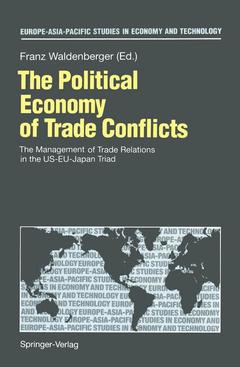Description
The Political Economy of Trade Conflicts, Softcover reprint of the original 1st ed. 1994
The Management of Trade Relations in the US-EU-Japan Triad
Europe-Asia-Pacific Studies in Economy and Technology Series
Coordinator: Waldenberger Franz
Language: English
Subjects for The Political Economy of Trade Conflicts:
Keywords
Agrarhandelspolitik; Agricultural Trade Policy; Commercial Policy; EU Trade Policy; European Union (EU); Handelspolitik; Handelspolitik der EU; International Economic Relations; Internationale Wirtschaftsbeziehungen; Japan; Japanese Trade Policy; Wirtschaftsbeziehungen; competition; political economy; trade policy
Publication date: 02-2012
157 p. · 15.5x23.5 cm · Paperback
157 p. · 15.5x23.5 cm · Paperback
Description
/li>Contents
/li>
David Ricardo's law of comparative advantage and his finding that free trade increases the wealth of all participating nations is one of the very few economic laws which is accepted by almost all economists. But economic reason and economic policy do not always follow the same path. This especially applies to trade policies. A substantial and growing part of trade between Japan, Europe and the US does not follow the principles of free trade, but is more accurately managed trade. The management of international trade, international trade negotiations, and the political dynamics of trade conflicts create a complex reality which follows its own laws without regard to economic policy prescriptions. This political-economic reality was the subject of the conference 'The Political Economy of Trade Conflicts' organizedjoindy by the German Institute for Japanese Studies and the Friedrich-Ebert-Foundation together with the Institute of Modern Political Science and Economics of Waseda University in December 1993. We present the results of the conference in this reader. Three issues were of special importance: the US-Japanese conflict over the reduction of trade imbalances via quantitative import targets; the liberalization of trade in agricultural products, especially the opening of the Japanese rice market; and the trade tensions between the European Union, the US and Japan in high technology industries. The conference took place immediately before the conclusion of the Uruguay Round, and yet its subject continues to be of high political importance. In early 1994, the US-Japan conflict around quantitative import targets became more tense.
Introduction: Change, Conflict, and the Management of Trade Relations.- One Changes in National, Bilateral, and Regional Trade Policies.- Foreign and Domestic Determinants of Trade Policy.- EU Trade Policy: Special Interests versus Social Welfare.- EU Trade Policy vis-à-vis Japan: From Confrontation to Cooperation.- Japanese Trade Policy and Political System.- The US-Japan Structural Impediments Initiative: A Model for Reducing Trade Friction?.- US-Japanese Trade Relations: Challenges and Opportunities.- Two Special Policy Areas.- Japanese Farm Products Trade and Japanese Agricultural Policy.- Historical Background of Government Interventions in Agriculture and Possible Compromise in Farm Trade.- EU Agricultural Policy and International Trade Conflicts.- The Role of Government in High Tech Trade.- Bureaucratic R&D Policies: The Japanese Example.- An Analysis of Antidumping Policies in World Markets for High Technology Products.- National Policies in a Global Economy: The Case of Competition Policy.- Author Profiles.
© 2024 LAVOISIER S.A.S.
These books may interest you

Politics of East Asian Free Trade AgreementsUnveiling the Asymmetry between Korea and Japan 160.25 €

China-US Trade War and Trade Talk 126.59 €


